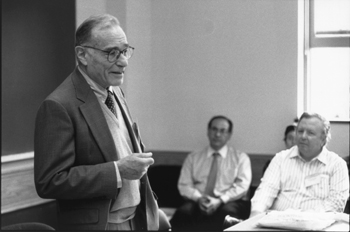 Lecture
Notes
Lecture
Notes
Seeing
beyond the eyes
How
do humans see? "The commonsense view is that we have eyes,
and so we see," says Sidney Schulman, the Ellen C. Manning
professor emeritus in the Biological Sciences Division. "But
the truth is we see with more than our eyes."

This
fall students in Schulman's course, Neurology and Kant's Theory
of Knowledge, are learning to see with philosophical as well
as scientific eyes, using one perspective to illuminate the
other.
"Immanuel
Kant didn't talk about the nervous system-he didn't even know
it existed," says Schulman, SB'44, MD'46. "But reading
his works, I began to see connections. The question for both
is: how is this piece of organic matter called the human being
able to know the space and matter around him?"
Schulman,
who has taught at the University since 1950 and has taught this
course since 1980, began closely studying the 18th-century philosopher
after finding arguments similar to Kant's theories in the works
of Heinrich Klüver, a German neurologist.
"Kant's
theory of perception is strikingly in accord with present-day
scientific thinking," says Schulman. "Neither sensation
alone nor thinking alone can account for the human experience
of the world around us. Both are essential and must work in
partnership."
The
approach is unusual, Schulman admits. "Many scientists
scorn and make fun of philosophers, but science started with
philosophy. It's a curiosity about the world that drives them
both."
The
class is a small discussion group of five students, mostly biology
concentrators. They read the first half of Kant's Critique
of Pure Reason, scientific papers on neurology, and Donald
Hebb's Organization of Behavior. Requirements include
a midterm, a final exam, and the occasional pop quiz.
-W.W.

![]()
 Lecture
Notes
Lecture
Notes 